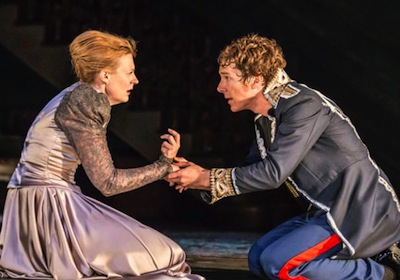 Director Lyndsey Turner had her hands full with the historic production of Hamlet that closes next week. Building a production around a high-wattage celebrity must bring a unique set of challenges.
Director Lyndsey Turner had her hands full with the historic production of Hamlet that closes next week. Building a production around a high-wattage celebrity must bring a unique set of challenges.
Here she was with the reigning theater superstar Benedict Cumberbatch, whose personal arsenal of dramatic weaponry stresses physical and vocal dazzle. Pitted against the young Prince of Denmark was gifted Irish actor Ciaran Hinds, a veteran of stage, screen and TV who brings both emotional thunder and intelligence to his role as Claudius, the new King.
The play clearly pits the young prince against his murderous uncle—the dynamic chosen by director Turner. Yet the hefty cast of supporting players—the strong-headed and duplicitous mother Gertrude, the naive maid Ophelia, stalwart comrade Horatio, sage courtier and father to Ophelia, Polonius, not to mention Ophelia’s vengeful brother Laertes—all of these characters contain potential for scenes of high conflict, verbal fireworks, and psychological innuendo.
The version of the play that I saw live on October 8 focused on the fierce battle of the wills between Hamlet/Cumberbatch and Claudius/Hinds. And given the ardor of theater-goers intent on feasting upon Cumberbatch’s incandescent presence, the director probably felt she was bound to let him be the focal point. The designer followed suit. Spotlights shape Cumberbatch’s every soliloquy in chiaro scuro tones. Marilyn Monroe was never lit with this much adoring care and drama.
And Hinds is given complete freedom to shape his every speech, and there are not many of them, into some pithy bit of venom and intrigue. From lighting to staging—when Cumberbatch unleashes at least one of his finest reveries, the entire cast falls into twilight shadow and moves in slow motion—the production highlights its two opposing male factions. But at the expense of tracking the puzzling relationship between Ophelia and Hamlet, between Horatio and Hamlet, between Laertes and anybody.
Only in the final duel to the death between Laertes and Hamlet does Ophelia’s brother have his moment of thunder. And their duel, done as brisk, superbly athletic swordplay, is brisk, frightening, and utterly believable.
While disappointed that some of the supporting characters seemed not to catch fire in their roles—Gertrude especially seemed unable to gain emotional traction —I’m betting it was the director’s decision to throw most of the production’s considerable elegance and energy in the direction of its superb lead actor.
Cumberbatch stole the show, and likely would have even without the director’s interpretation.

